“The greatest threat to our planet is the belief that someone else will save it.” – Robert Swan. This quote highlights the need for us to take action to protect our planet. Greece is a prime example of how eco-tourism can be done right. It offers a mix of adventure and care for the environment.
Greece is leading the way in eco-tourism, with more green hotels and tours. The number of eco-tourists has grown by 30% in five years1. People want to see Greece’s beauty while also helping the planet. So, places in Greece are focusing on being kind to the environment and keeping local traditions alive.
Greece is working hard to keep its nature and culture safe. Places like the National Marine Park of Alonissos and organic farms are key. These efforts help protect the sea and support local plants and animals2. This means travelers can have a great time and help Greece at the same time.
Visitors can help Greece stay green by choosing eco-friendly travel. This way, they ensure the beauty of Greece will be there for others to see. We’ll look at the best places to visit, stay, eat, and do things in Greece. We’ll also see how important it is for locals to be involved in keeping Greece beautiful.
Key Takeaways
- Eco-tourism is experiencing significant growth in Greece, with a 30% increase in just five years.
- Travelers are increasingly seeking eco-friendly accommodations, demonstrating a demand for sustainable travel options.
- In Greece, various marine conservation initiatives are being implemented to protect delicate ecosystems.
- Organic farming promotes sustainable agricultural practices, positively impacting local biodiversity.
- Community involvement is crucial for successful eco-tourism and preserving cultural heritage.
Introduction to Eco-Tourism in Greece
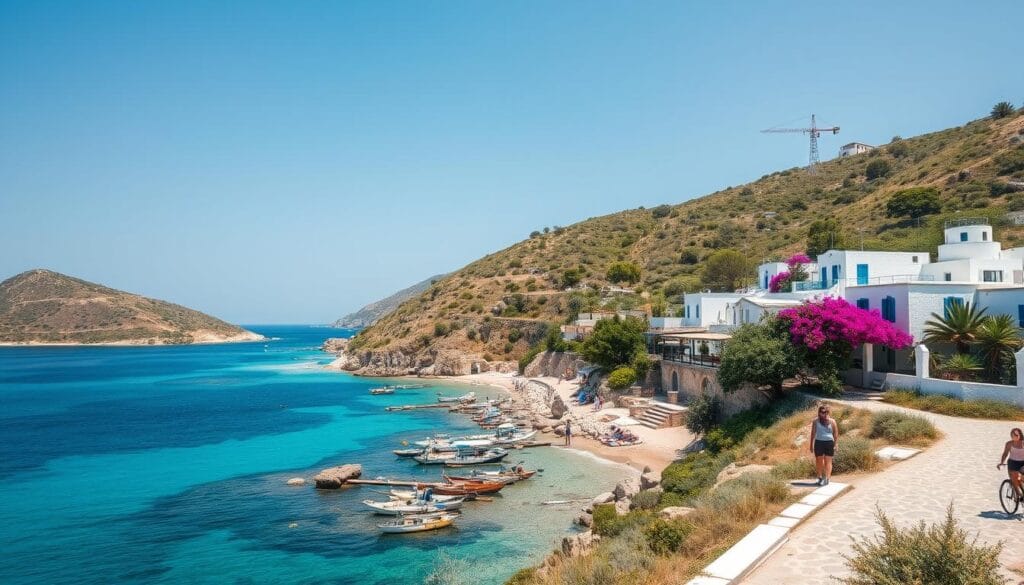
Eco-Tourism in Greece focuses on traveling responsibly. It aims to protect the environment and support local communities. This way, tourists can enjoy Greece’s culture and nature without harming it.
Definition of Eco-Tourism
Eco-tourism is about traveling in a way that saves nature. It encourages people to learn about and respect local cultures. This helps build a deeper connection with the places we visit.
Importance of Sustainable Travel
Responsible Tourism in Greece is vital. The country has beautiful landscapes and rich cultures. Sustainable travel helps keep these treasures safe from harm.
With more tourists coming each year, the need for green travel grows. In 2015, almost 25 million visitors came to Greece. This shows the importance of sustainable tourism3.
The tourism industry is a big part of Greece’s economy. It brings in about 17 billion Euros and supports almost 800,000 jobs. This makes sustainable tourism key for the country’s future3.
Current Trends in Eco-Tourism
More people want eco-friendly and meaningful travel experiences. They look for trips that help local communities and protect nature. The 2009 economic crisis led to a shift towards sustainable tourism4.
Visitors enjoy exploring mountains, organic farms, and eco-resorts. Places like Enagron in Crete offer unique experiences. They show off organic farming on a 15-acre farm4.
There’s also a rise in sustainable hotels. By early 2016, around 240 hotels were recognized for their green efforts3.
The Natural Wonders of Greece
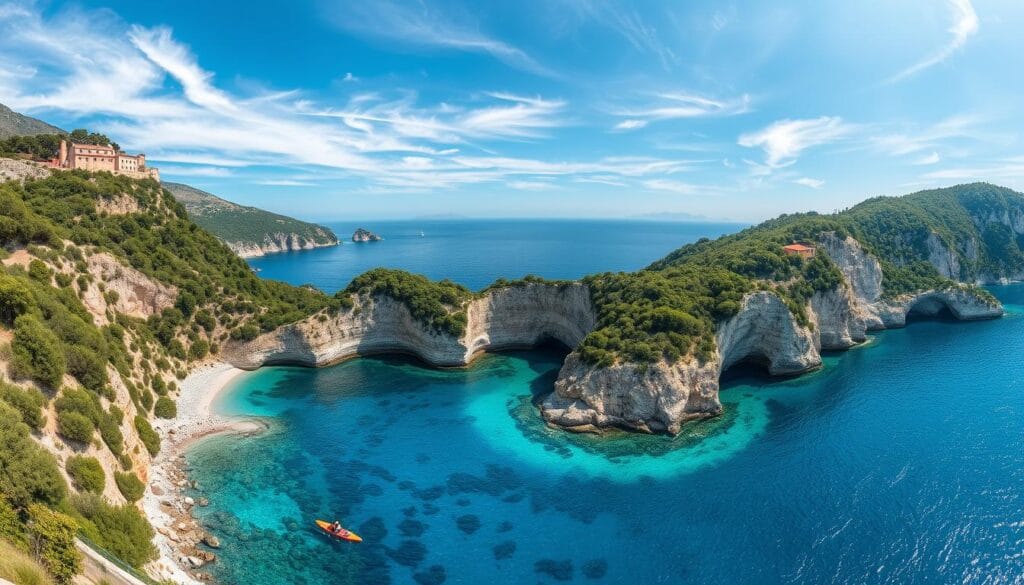
Greece is a treasure trove of Natural Wonders, drawing eco-tourists from everywhere. It’s dedicated to keeping its stunning landscapes and ecosystems safe. This is done through many Protected Areas.
These areas are not just beautiful. They also help protect endangered species and their homes.
National Parks and Protected Areas
The National Marine Park of Alonissos is key in fighting environmental dangers5. Almost one-fifth of Greece is part of the European Ecological NATURA 2000 network6. This shows Greece’s strong commitment to saving nature.
This network works to protect the wide range of plants and animals in Greece’s amazing landscapes.
Marine Biodiversity
Greece’s seas are perfect for sailing and diving, showing off the country’s rich marine life. The water is clear, making it great for underwater explorations7. Divers can see corals, colorful sponges, and rare species.
This highlights the need to keep these marine areas safe6.
Unique Landscapes
The Samaria Gorge in Crete is one of Europe’s longest natural wonders, stretching 18 kilometers7. The Pindus Mountains and Zagoria’s stone villages are also unique. They offer a magical setting for those who love nature7.
Greece is also rich in plant life, with over 6,000 species and sub-species6. This makes Greece a top spot for eco-tourism.
Top Eco-Friendly Destinations in Greece
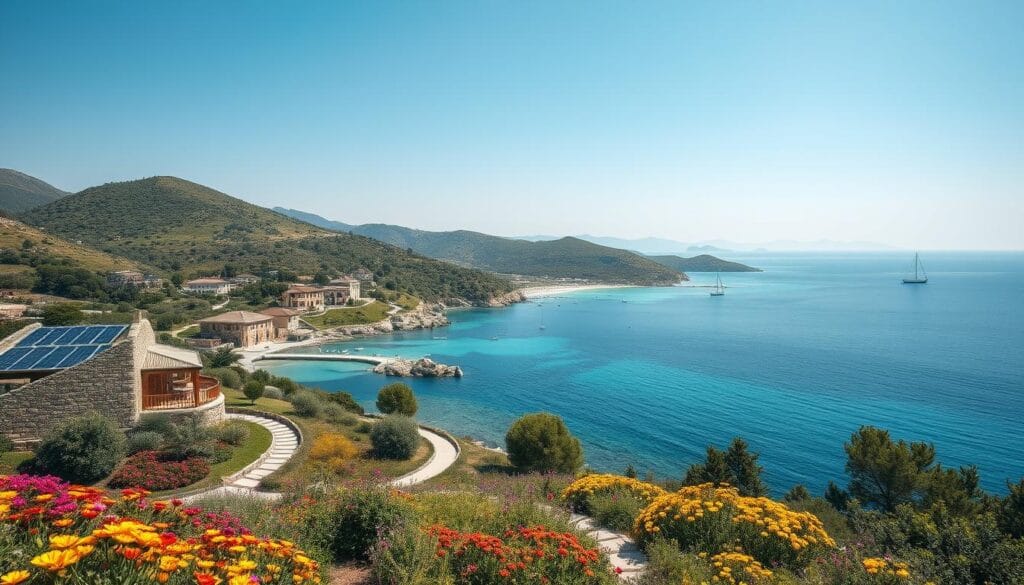
Greece has many places perfect for eco-friendly travel. Each spot has its own special qualities that make it great for green travel.
Thessaloniki
Thessaloniki is a lively city that loves the environment. It has lots of green spaces and works hard to protect local wildlife. Visitors can enjoy parks and gardens, which are more than just places to relax. They are also important for the city’s green efforts8.
Crete
Crete is famous for its farm stays and cooking classes that focus on fresh, organic food. It also has amazing hiking trails that take you through different landscapes. This makes Crete a top choice for those who love exploring nature in a sustainable way89.
The Peloponnese
The Peloponnese is full of farm tours and organic farming activities. It’s a great way for tourists to help local farmers and learn about green living. Plus, you get to see Greece’s beautiful countryside10.
Responsible Accommodation Options
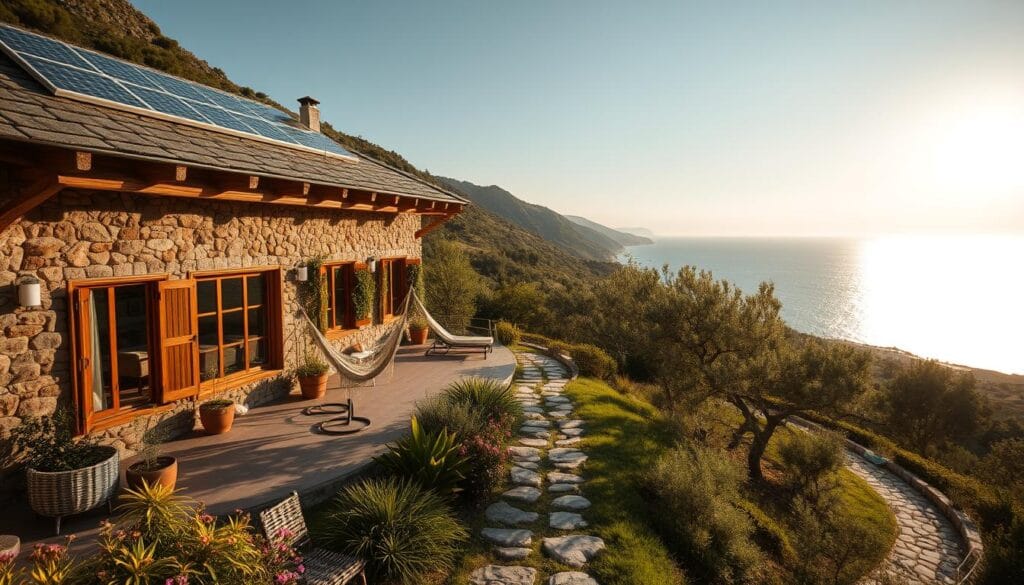
Choosing where to stay in Greece is key to sustainable travel. More people now choose Eco-Lodges and Green Hotels. These places focus on the environment and offer special experiences. About 57% of travelers look for sustainable places to stay1.
In Greece, 30% of hotels use renewable energy to lessen their impact1.
Eco-Lodges and Green Hotels
Eco-Lodges and Green Hotels aim to reduce their environmental impact. They also let guests enjoy Greece’s beauty. These places use green energy, manage waste well, and buy food locally. This helps their communities.
Milos is a great example. It supports sustainable tourism with waste management and green energy2.
Certifications to Look For
Look for certifications to find sustainable places. Green Key and EarthCheck show a hotel’s commitment to the environment. Choosing places with these certifications helps the planet and local businesses.
Community-Based Lodging
Community-based lodging lets tourists connect with locals and support the economy. These places offer real experiences. Guests can help local artisans and businesses.
This kind of tourism boosts local sales by 20%. It increases sales of fresh produce and handmade goods1.
Sustainable Dining Experiences

Greece is now focusing more on Sustainable Dining Experiences. They use local ingredients and eco-friendly food practices. Farm-to-table restaurants are popular, serving dishes made with fresh produce from local farms.
These places support local agriculture and cut down on carbon emissions. They do this by reducing transportation needs. This approach to dining is great for those who care about the environment.
Farm-to-Table Restaurants
Farm-to-table dining in Greece highlights the value of Local Cuisine. It lets visitors enjoy real flavors while helping local farmers. For over 30 years, Explore’s Greek Island Cruise has made sustainable dining a key part of the experience11.
Restaurants work with nearby farms to offer seasonal dishes. This makes the dining experience even better.
Traditional Greek Cuisine with a Twist
Modern takes on traditional Greek dishes are exciting the local food scene. For example, Mrs. Koula’s cookery classes in Vamos village, West Crete, focus on fresh organic produce11. This mix of old and new shows the beauty of Greek cooking.
It attracts those looking for something unique in their dining experience.
Sustainable Seafood Practices
Seafood is a big part of Greek food, and sustainable fishing is becoming more common. Many restaurants now choose seafood that’s caught responsibly. This helps protect Greece’s marine life12.
Places like Telendos in the Dodecanese offer great food and views. They focus on eco-friendly food practices11.
Choosing local and sustainable food options is good for our bodies and the community.
Adventure Activities and Eco-Tourism
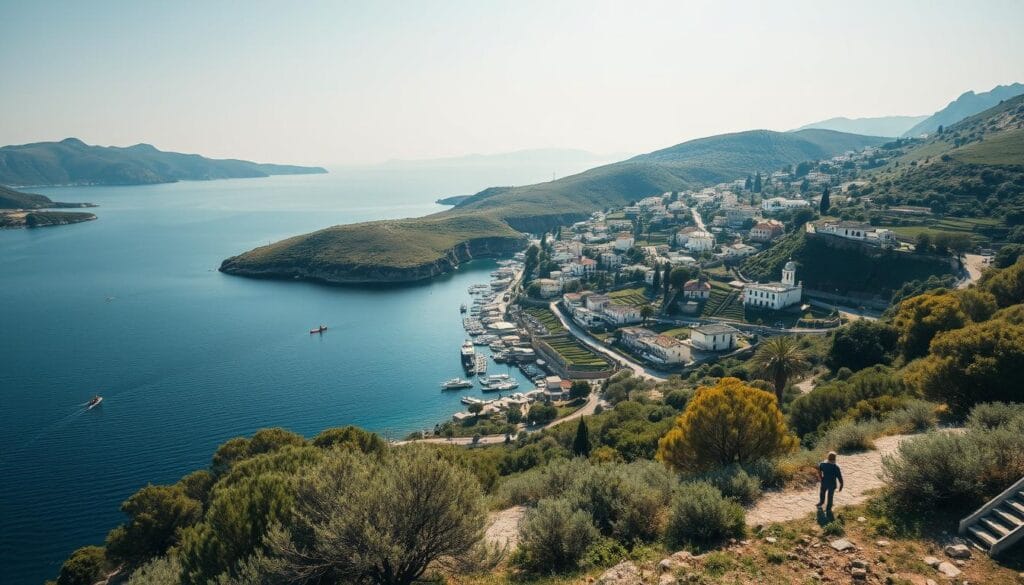
Adventure Tourism in Greece offers many activities that are good for the planet. These include hiking, kayaking, and watching wildlife in a responsible way. They let travelers see Greece’s stunning landscapes while taking care of nature.
Hiking Trails with Minimal Impact
Hiking is a favorite way to see Greece’s beautiful terrain without harming the environment. Places like the Samaria Gorge and Mount Olympus have trails that are easy on nature. They let visitors see amazing views while keeping the ecosystem safe.
These trails are made to not hurt the environment. They help make sure nature stays beautiful for everyone in the future.
Kayaking and Water Sports
Kayaking and other water sports are fun ways to see Greece’s beautiful coasts. They’re great for staying active and learning about marine life. But, it’s important to follow rules to protect the sea and its creatures.
Wildlife Watching with Ethical Guidelines
Watching wildlife in Greece needs to be done the right way. Tour guides teach visitors how to see animals without disturbing them. This helps keep local animals safe and makes the trip better for everyone.
Educational Eco-Tourism Opportunities
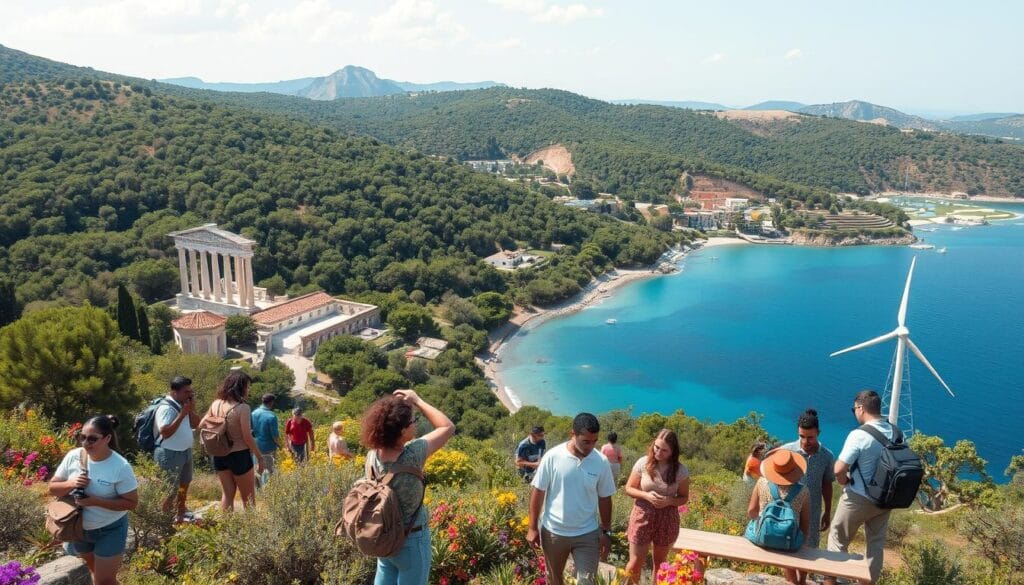
Greece is a treasure trove for those who love Educational Eco-Tourism. It’s not just about traveling; it’s about learning about local cultures and ecosystems too.
Workshops and Cultural Exchange
In Greece, workshops teach you about traditional crafts, local food, and how to live sustainably. They offer a chance to connect with local artists and communities. This way, you get to learn in a very hands-on way.
Conservation Programs
There are many programs in Greece that let tourists help protect the environment. By getting involved, you learn how vital nature conservation is. It makes your trip even more meaningful.
Guided Nature Tours
Guided tours in Greece show you the amazing plants and animals of the Mediterranean. These tours help you understand the importance of this environment. It’s a key part of Educational Eco-Tourism. Also, tourism in Greece is growing, and it’s working on being more sustainable13.
By taking part in these activities, you make your trip better. You also help local communities and the environment. Educational Eco-Tourism is all about respecting both culture and nature.
In 2019, tourism made up 10.4% of global GDP, showing its big role in the economy14.
Most Greek tourism groups see fighting climate change as a big challenge. They’re working on ways to make tourism better for the planet15.
This teamwork means tourism can be a positive force. It helps both the people visiting and the places they see13.
Local Community Involvement in Eco-Tourism
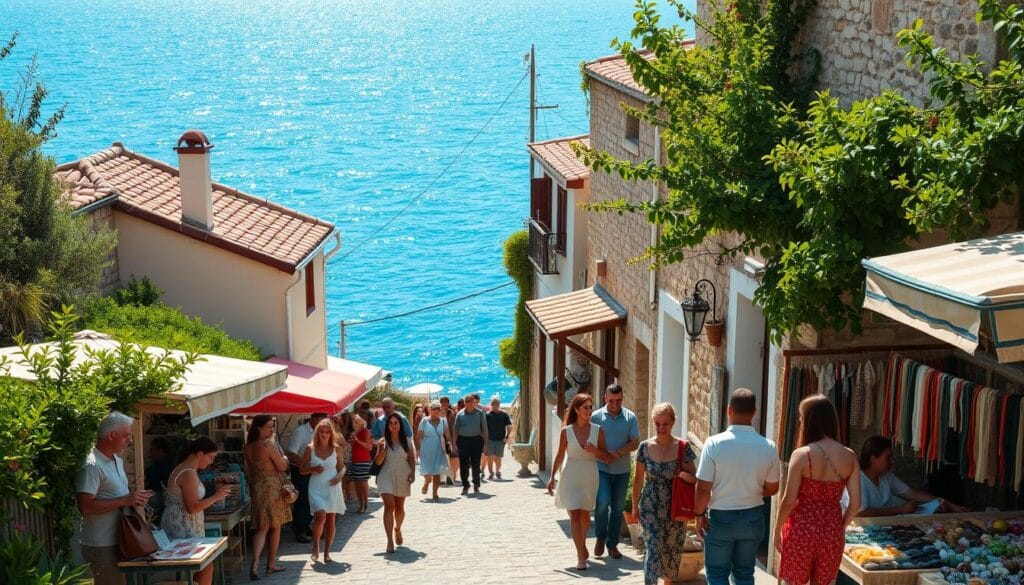
Getting locals involved in eco-tourism is key for a sustainable future. It helps both the community and visitors. Together, they gain economically and culturally. Many places are now focusing on reducing waste and going green16.
The tourism world is catching on to the green trend. It sees being eco-friendly as a way to stand out16.
Benefits of Community Engagement
Supporting local artisans and businesses boosts identity and job creation. Eco-tourism encourages sustainable living that fits with local traditions. In Greece, for example, community involvement is a big part of their green tourism plan13.
This plan helps protect nature and culture, empowering local communities13.
Successful Case Studies
There are many examples of how local involvement makes eco-tourism better. In Greece, for instance, there are plans to diversify tourism and extend the season13. These efforts highlight the value of local crafts and sustainable living.
How Tourists Can Support Local Communities
Tourists can help by buying local goods and taking part in community tours. This way, they learn about the culture and support the economy. The OECD Tourism Statistics database shows the power of sharing experiences to improve tourism17.
Challenges Facing Eco-Tourism in Greece
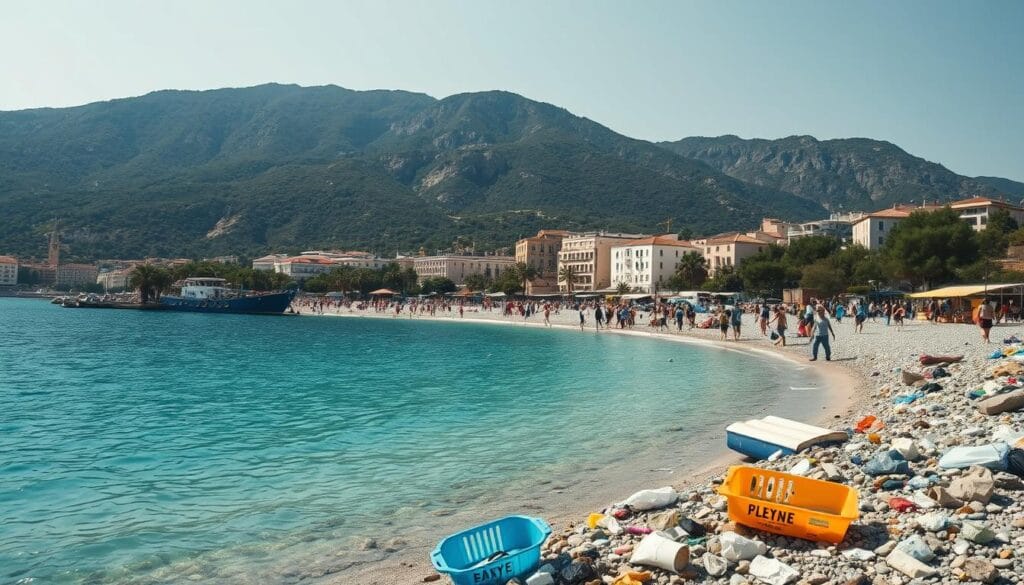
The number of tourists in Greece has grown, leading to challenges in eco-tourism. This is mainly because of over-tourism. In 2023, Greece saw a record 33 million tourists, up 5 million from the year before18. This increase puts a lot of pressure on natural resources and local infrastructure, making it harder to be sustainable.
Over-Tourism Concerns
The sudden increase in visitors has put a lot of stress on local environments. Places like Santorini and Mykonos are facing too much construction and tourism. This is harming their ecosystems and threatening the coastlines of Greece19.
Environmental Pollution
The rise in tourism has also led to more pollution. This pollution affects Greece’s beautiful landscapes and cultural sites. Air travel, a big source of carbon emissions, is especially harmful to the environment19. Local communities often don’t get to enjoy the economic benefits of tourism, leaving them facing the pollution and degradation19.
Climate Change Effects
Climate change is making things even harder for eco-tourism in Greece. The report says we need to act fast to protect the environment and deal with climate risks. Greece wants to be carbon neutral by 2050, so we need to protect nature and cultural sites while adapting to climate change20.
Eco-Conscious Travel Planning
Planning eco-conscious travel means thinking about many factors. It’s important to choose eco-friendly tour operators who care about the planet. Look for companies that use green resources and support local communities.
How to Choose an Eco-Friendly Tour Operator
Finding the right eco-friendly tour operator is crucial. Look for those who care about the environment. They should use local guides and help protect nature. Also, choose operators who reduce carbon emissions for a greener trip21.
Tips for Responsible Packing
Responsible packing is key for eco-friendly travel. Use biodegradable toiletries and pack reusable items like water bottles. This reduces plastic waste in your travel spots.
Off-Season Travel Benefits
Traveling off-season has many perks. You’ll see fewer people and get closer to local culture. Plus, you might find better deals and unique experiences22.
Governmental Policies Supporting Eco-Tourism
The Greek government sees Eco-Tourism Legislation as key to promoting sustainable travel. It aims to balance environmental protection and economic growth. This is crucial for making tourism more eco-friendly.
Current Legislation
A recent agreement shows Greece’s dedication to sustainability. The Greek Ministry of Tourism and the Global Council of Sustainable Tourism signed it on March 9th. They plan to create a 10-year Strategy for Sustainable Tourism Development23.
They also want to certify sustainable tourism products to meet global standards23. The Ministry is working to make sustainability standards consistent across Greek tourism23.
Funding and Initiatives
Money is important for these plans. Projects like the one in East Attica are promising, with a net present value of €21,885,737.8224. They also have a benefit-cost ratio of 1.7024.
Various funding efforts support renewable energy and reduce tourism’s carbon footprint. Tourism is responsible for 8% of global carbon emissions25.
Role of Tourism Boards
Tourism boards play a big role in promoting sustainable travel. They focus on community projects and local involvement. This helps spread the word about sustainable tourism.
These boards work closely with the government. They help decide where to invest in eco-friendly projects. They also train officials and add more eco-friendly places to the tourism map23.
The Role of Technology in Eco-Tourism
Technology is key in making travel more sustainable, especially in eco-tourism. Many eco-friendly apps help travelers find green places to stay, eat, and play. A Booking.com survey found 82% of travelers value sustainable travel26. Also, 70% want to stay in places that are good for the planet26.
Eco-Friendly Apps and Resources
Thanks to tech, we now have apps for sustainable travel. They guide us to eco-friendly spots, offer tips, and help us offset carbon. The eco-tourism market is booming, reaching USD 180 billion in 2019 and expected to hit USD 330 billion by 202727.
Virtual Tours and Online Experiences
Virtual tours let us explore places without leaving home. They’re good for the planet and enrich our travel experiences. These tools also help conservationists track wildlife and ecosystems, supporting eco-tourism’s green goals.
Innovative Transportation Solutions
New ways to travel are popping up, like ride-sharing and electric cars. These options cut down on pollution. The Mediterranean, known for its wildlife, benefits from these green travel choices27.
Future of Eco-Tourism in Greece
Eco-tourism in Greece is changing, thanks to more people caring about the planet. Travelers now want to help protect the environment. The future will see more focus on saving nature and helping local communities.
Trends and Predictions
There’s a big move towards Trends in Sustainable Travel in Greece. More eco-friendly places to stay are popping up, like Coco-Mat Eco Residences in Serifos. These places use green tech to reduce harm to the environment28.
People are also looking to explore off-the-beaten-path places, like Zagori and Prespa Lakes. This shows they want to see more of Greece’s hidden gems28.
Increasing Tourist Awareness
After a big drop in 2020, tourism in Greece is bouncing back. More visitors want to travel in a way that’s good for the planet. They’re choosing to support local spots and help protect the environment29.
Activities like hiking and helping with marine conservation are becoming more popular. This shows travelers are eager to get involved in eco-friendly activities28.
Long-Term Sustainable Practices
Greece is not just attracting digital nomads with its visas and setup. It’s also focusing on green transport, like electric cars and better public transport29. This shows Greece’s dedication to a sustainable travel future.
By focusing on eco-friendly actions and raising awareness, Greece is paving the way for a greener tourism industry. It’s a future that values both nature and culture28.
Conclusion: Embracing Sustainable Travel in Greece
Greece is becoming a top spot for eco-tourism. It’s key for travelers to understand how their choices help or harm. By picking eco-friendly places to stay, joining local conservation efforts, and eating sustainably, we can help protect Greece’s beauty and culture.
Recap of Key Points
We’ve looked at eco-tourism in Greece, from its stunning nature to tech helping travel. More people are choosing eco-friendly travel, which is good for both visitors and the planet30. With tourism causing a big carbon footprint, it’s crucial to travel responsibly31.
The Impact of Individual Choices
Our actions have a big impact, affecting travel and local economies. By making eco-friendly choices, we help protect places like Kefalonia from damage32. Every decision we make can help save Greece’s wonders or harm them.
Call to Action for Travelers
Travelers should act responsibly on their trips. This means supporting green businesses, reducing waste, and learning about local conservation. Together, we can keep Greece’s beauty alive for future generations. For more tips on sustainable travel in Greece, check out: Eco-Tourism in Greece303132.
FAQ
What is eco-tourism in Greece?
How can I find eco-friendly destinations in Greece?
What types of sustainable accommodations are available in Greece?
Are there any eco-tourism activities I can participate in?
How does dining sustainably work in Greece?
What role do local communities play in eco-tourism in Greece?
What are some challenges facing eco-tourism in Greece?
How can I plan eco-conscious travel to Greece?
What policies does the Greek government have in place to support eco-tourism?
How is technology shaping the future of eco-tourism in Greece?
Source Links
- Eco-Tourism in Greece: Sustainable Travel Tips and Destinations
- Sustainability in Greece | Original Travel
- Destination Check: Tourism Sustainability in Greece
- Mindful Travel: 5 Eco-Friendly Retreats in Greece | The Greek Vibe
- Sustainable Greece: 10 Eco-Travel Experiences – Campaign Recap
- Ecotourism holidays in Greece & the islands | Greeka
- Ecotourism in Greece – Greece Insiders
- Tailor Made Holidays to Greece, Cyprus, Azores & more | Sunvil.co.uk
- 6 of the best sustainable trips in Greece | Travel Weekly
- 10 eco-friendly coastal adventures to have in Greece – Wanderlust
- 10 eco-friendly culinary experiences to have in Greece – Wanderlust
- Sustainable tourism in the cradle of Europe
- Greece Continues to Push for Sustainable Tourism – Greece Is
- Deloitte_INSETE_Sustainability_Report 2023
- Ecotourism in the Greek islands: Lost in vagueness
- Promoting Green Tourism Synergies with Cultural and Creative Industries: A Case Study of Greece
- Sustainable Tourism – Adapting to Climate-Induced Holiday Trends
- Greece Tourism Industry at Risk as Government Watchdog Warns of Over development and Environmental Threats – Travel And Tour World
- Challenges of Sustainable Tourism: Here’s How to Overcome Them
- How Greece and Turkey are Making the Mediterranean an Eco Travel Destination
- Sustainable Travel to Greece?
- Responsible Travel in Greece: Why It Matters & How To Do It | It’s All Trip To Me
- Greek Ministry of Tourism Joins GSTC
- Guide to Sustainable Tourism in Athens – AIRIO Suites Athens
- The Role of Technology in Promoting Sustainable Travel Practices
- Sustainable Ecotourism through Cutting-Edge Technologies
- Eco-Tourism in Greece
- The Future of Greek Tourism: Trends and Opportunities
- Sustainable Travel In Piraeus – SAVOY Hotel Piraeus
- Eco-responsible travel: our guide for 2024
- Green Technology for Sustainable Tourism in Kefalonia – Argostoli

















